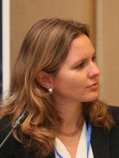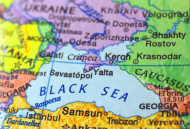 |
|
|
 Diba Nigâr Göksel |
|
“This issue of Turkish Policy Quarterly (TPQ) focuses on the geopolitical contests and clashes of visions in the common neighborhood of the EU, Russia, and Turkey. Besides featuring critical analysis on the divergence of identity conceptions and political values within this wider region, various dimensions of ongoing power struggles are assessed, including energy security, cyber security, elections, and revolutions.”

|
|
|
| |
 |
|
|
 Toomas Hendrik Ilves |
|
“By adopting liberal democratic values, each state not only paves its road to the EU and NATO, but also becomes internally stronger, and a better place for its own citizens.”
“The three countries of the South Caucasus are all different, but Turkey could help them all, including Armenia.”
“I believe all nations are capable of democracy; of course, you have to want it to succeed in it – that is why democratization was so quick and smooth for parts of Eastern Europe.”
“I have a hard time understanding why Russia spends so much on military equipment when the actual and acute challenges for the country are non-military.”

|
|
|
| |
 |
|
|
 Philip M. Breedlove |
|
“While it is well known that NATO has different views with Russia in certain areas such as missile defense, there are many other areas in which we are working together in order to achieve the goals set out at the NATO-Russia Council (NRC) summit in Lisbon in 2010.”
“With our support, Afghanistan has a strong foundation to build a secure future, but it is ultimately up to the Afghans to make that a success.”
“Exhibiting the essence of collective security and deterrence, NATO responded to Turkey’s request for a Patriot anti-missile capability to augment its air defense systems in December 2012.”

|
|
|
| |
 |
|
|
 George Ciamba |
|
“Romania is among the strongest supporters of Turkey’s European integration and attaches high importance to cooperation with Turkey in NATO and other regional institutional frameworks.”
“In the Euro-Atlantic community we should think in a more focused manner of what we can do to concretely guarantee that the pro-European choices of our partners are respected.”
“Energy –and, more specifically, access to energy– is a double-edged sword that can both sustain democracy-building and create economic and regional rivalries at the same time.”

|
|
|
| |
 |
|
|
 Pavel K. Baev |
|
“Erdoğan and Putin see great benefits in sustaining their special relations for advancing their respective geopolitical visions.”
“Putin’s master-plan for constructing the South Stream gas pipeline across the length of the Black Sea has always clashed with Turkey’s desire to host a ‘gas corridor’ on its territory.”
“The dialectics of the revolution/counter-revolution conflict remain fluid, and the Assad regime in Syria may yet suffer a decisive defeat, but Erdoğan has already moved closer to Putin in the assessment of mass uprisings as a destabilizing factor and a major risk to domestic order.”

|
|
|
| |
 |
|
|
 Amanda Paul |
|
“Kiev has always been more efficient at ‘talking the talk’ rather than ‘walking the walk’ in terms of taking steps to bring it closer to the EU.”
“The Eurasian Customs Union (ECU) encapsulates Russia’s belief that it has a ‘privileged’ role in this neighborhood.”
“If Ukraine had a democratic leadership that was accountable to the people, the decision to ditch the EU agreements would never have been made.”

|
|
|
| |
 |
|
|
 A Conversation with Gerald Knaus |
|
“When we talk today about ‘European values’, what we really mean is the aspiration that this continent should finally become a continent of liberal democracies.”
“There is a clear choice: either the ‘managed democracy’ model of Putin, which exports only raw material and the money of its elites, or real parliamentary democracy that every Ukrainian can see when visiting Poland.”
“It is very disappointing to see Turkey regularly side with the autocracies in Eastern Europe when it comes to issues of human rights in the Council of Europe.”

|
|
|
| |
 |
|
|
 Gal Luft |
|
“The assertion that the U.S. could depart from the Middle East due to a change in its energy landscape is based on an oversimplification of U.S. strategic interest in the region.”
“The U.S. carried most of the burden of the Iraq War in terms of blood and treasure, yet the oil spoils are shared today by China and Russia with almost no contracts awarded to American companies.”

|
|
|
| |
 |
|
|

Simone Tagliapietra |
|
“Turkey’s natural gas consumption has grown dramatically over the last decade –from 15 billion cubic meters (bcm) in 2000 to 46 bcm in 2012– making it the most dynamic natural gas market in the OECD region.”
“In the long-term, natural gas producing countries located around Turkey will likely have the potential to export significant volumes of gas to the EU, but this potential will become a reality only if the EU market actually needs more natural gas supplies.”

|
|
|
| |
 |
|
|
 Oktay F. Tanrısever |
|
“The EU developed the EaP initiative in order to develop closer relationships with its Eastern partners, since the region is of strategic importance and faced the risk of coming under the Russian sphere of influence.”
“The significance of the Vilnius Summit of the EaP stemmed from the fact that the Eastern partners of the EU were expected to demonstrate their commitments to adopting institutionalized special trade regimes, as well as new rules for human mobility between the EaP countries and the EU.”

|
|
|
| |
 |
|
|
 Marine Manucharyan |
|
“The Armenian retreat from its planned Association Agreement with the EU and its move toward Russia’s Customs Union also reveals several deeper deficiencies within the Armenian government in terms of closed public policy, inadequate strategic planning, and an informal decision-making process.”
“The decision to join the Customs Union also offers Armenia little –if any– alternative benefits, and may lock Armenia even more firmly within the Russian orbit.”

|
|
|
| |
 |
|
|

Cem Toker |
|
“Given the tense and polarized climate following mass protest against Erdoğan’s heavy-handed rule during the Gezi protests, and the public outcry in the wake of the corruption investigations initiated against AKP insiders on 17 December, the potential seems high for the AKP to try to use whatever means available to establish that it is not losing ground among the public.”
“Ensuring free, democratic, and fair elections allowing for a peaceful transition of power in Turkey is vital especially in a period when Turkish democracy is promoted as a model to regimes struggling to transition to democracy in the Arab world.”

|
|
|
| |
 |
|
|

Isabelle Langerak |
|
“By providing its population with certain social and economic stability, and hope for improvement in the future, the regime dampens latent pressures for democratization.”
“Particularly now that Russia is on the rise in the region, the concern that Azerbaijan may become increasingly pro-Russia is an important explanatory factor in the West’s reluctance to push for political reform in Azerbaijan.”

|
|
|
| |
 |
|
|
 ECFR & demosEUROPA |
|
“Turkey is definitely the most significant destination for Azerbaijani investments and its importance will clearly increase as a result of the implementation of the energy projects which will boost Azeri FDI in Turkey to 17 billion dollars by 2018.”
“Despite the lasting strategic significance of hydrocarbons and the political importance of countries such as Russia and Azerbaijan in Turkey’s foreign affairs, the Black Sea has moved in a downwards direction regarding the overall neighborhood strategy pursued by Ankara compared to the 2000s.”

|
|
|
| |
|
Address: Kadir Has Üniversitesi Cibali Kampüsü Sosyal Sorumluluk Binası ( Beyaz Ev )
Küçük Mustafa Paşa Mah. Seferikoz Sok. No:14 Kat.1 Fatih- İstanbul
Phone: +90 212 621 4442 - +90 212 621 9258 Fax: +90 212 531 8718 info@turkishpolicy.com
|
|









